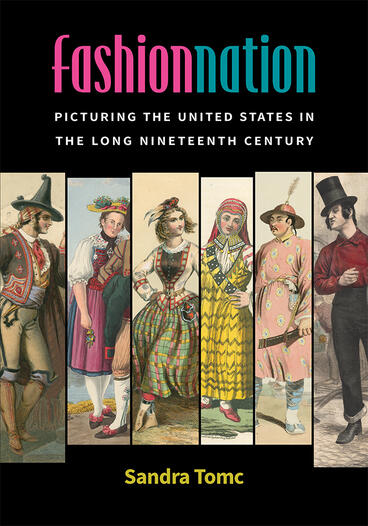Fashion Nation
Picturing the United States in the Long Nineteenth Century
A colorful look at the relationship between ethnic nationalism and gaudy dress in the early 19th-century United States
Description
Fashion Nation argues that popular images of the United States as a place of glitter and lights, of gaudy costumes and dizzying visual surfaces—usually understood as features of technomodernity—were in fact brewed in the rich, strange world of early nineteenth-century British and European folk nationalism when nations were compelled to offer visual manifestations of their allegedly true ancestral form. Showing that folk and ethnic nationalism played a central role in writing and culture, the book draws on a rare and colorful visual archive of national costumes, cartoons, theatrical spectacles, and immersive entertainments to show how the United States sprung to life as a visual space for transatlantic audiences. Fashion Nation not only includes chapters on major U.S. travel writers like Nathaniel Parker Willis and James Fenimore Cooper, but it also presents explorations of the vogue for folk and ethnic costume, the role of Indigenous dress in Wild West spectacles, and the nationalistic décor on display at late nineteenth-century world’s fairs and amusement parks. Engagingly written and beautifully illustrated, Fashion Nation opens the door to a forgotten legacy of visual symbols that still inhabit ethnic and white nationalism in the United States today, showing how fantasies of glittery surfaces were designed to draw the eye away from a sordid history.
Sandra Tomc is Professor of English Language and Literatures at the University of British Columbia, Vancouver.
Reviews
“Vividly written and brilliantly argued, Fashion Nation brings the 19th century to life by showing how the idea of a superficial, surface-loving America evolves over the course of the long 19th century. Though focused on surface displays ranging from sartorial excess to glittering amusement parks, Fashion Nation is a deeply searching and absorbing look into how such display served to consolidate and signal American ethnic national identity. This study will open new ways of interpreting visuality across the American literary canon, American culture, and beyond.”
- Jason Richards
—Jason Richards, Rhodes College
“Through brilliant readings across a panoply of cultural texts ranging from novels to fashion illustration to amusement parks, Tomc whisks the curtain back on the dressing room of the American national consciousness, showing what the nineteenth-century cultural preoccupation with ethnic clothing and ‘folk’ costume reveals about what would become the hegemonic American ‘style’: a ‘contentless visual extravaganza’ that offers flash, color, and glitter as a way of refusing ethnic definition.”
- Lauren Cardon
—Jean Lee Cole, Loyola University
"Fashion Nation makes a timely and significant contribution to understanding the history of ethnicity and national identity in the American context. Most importantly, this book challenges us to think about national style in flexible and multidimensional ways. Tomc shows that discourses of ethnicity can simultaneously operate as a means of constructing and signaling shared identity and as a way of foiling identification."
- Yvette R. South
Honorable Mention: Canadian Association for American Studies (CAAS) 2021 Robert K. Martin Book Prize
- CAAS Robert K. Martin Book Prize

